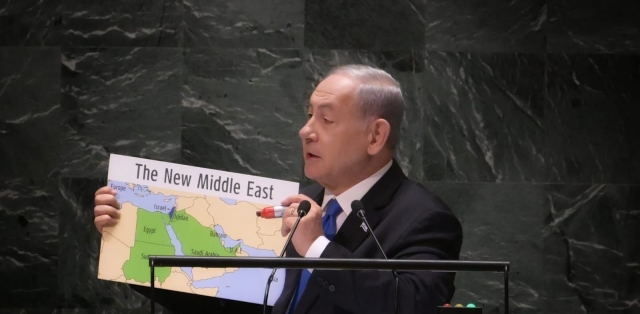Prime Minister Benjamin Netanyahu concluded his nearly week-long political visit to the United States by departing from New York early on Sunday, a trip that even his staunchest critics acknowledged as productive. Netanyahu and his team worked tirelessly to ensure that the plane departed as early as possible, aiming to land in Israel before the airport closed for Yom Kippur. Despite some delays, the flight is scheduled to touch down around 2:00 PM Israel time.
Just prior to the start of the Sabbath, Prime Minister Benjamin Netanyahu granted an interview to the Fox News network. During the interview, he expressed satisfaction with the optimistic signals coming from Crown Prince Mohammed Bin Salman of Saudi Arabia regarding efforts to normalize relations between the two nations.
Israeli PM @netanyahu announces a historic vision for
— Ellie Cohanim (@EllieCohanim) September 22, 2023
“The New Middle East”🕊️
-Premised on Peace between Israel & Saudi Arabia
-Not just relations between
nation-states, but a historic alignment between the children of Abraham, between Islam & Judaism
pic.twitter.com/JNmhlswahk
These comments were in line with the message delivered in Netanyahu's address at the United Nations, where he emphasized the importance of involving the Palestinians in the peace process while maintaining that they should not have the power to veto it. He pointed out, "The reason we haven't reached a peace agreement with any country in the 25 years following the deals with Jordan and Egypt is that we were told we must first cater to the Palestinians. We were asked to make peace with them, but there's a fundamental issue: the Palestinians don't want peace."
Regarding the Abraham Accords, Netanyahu hailed them as a new era of peace. However, he went further, expressing his belief that a peace agreement with Saudi Arabia would represent an even more momentous breakthrough, potentially reshaping the entire Middle East.
Notably, even Yair Lapid, a staunch critic of Netanyahu and a prominent figure in the Knesset's opposition, conceded that Netanyahu's trip had been a success. Lapid voiced support for an agreement with the Saudis, stating, "All things considered, Netanyahu had a good trip," and adding, "I am in favor of an agreement with the Saudis. During my time, I would not have considered approving their uranium enrichment."
ראש הממשלה בנימין נתניהו בראיון מיוחד לפוקס ניוז >> pic.twitter.com/lwtBxBlAyQ
— Benjamin Netanyahu - בנימין נתניהו (@netanyahu) September 24, 2023
Lapid went on to emphasize that his opposition was not driven by a desire to obstruct progress, stating, "We are not a divisive opposition. I support an agreement with the Saudis. The groundwork for flights over Saudi Arabia was laid during my tenure, but I would never have approved uranium enrichment for them, as it would bring them closer to nuclear capabilities." In an unexpected turn, Lapid also signaled a willingness to support the government from outside the Knesset if it faced challenges in securing support for any concessions demanded by the Saudis. He declared, "We won't be part of the government, but we will offer support from the sidelines. If the government can't hold itself together, that's their problem."


